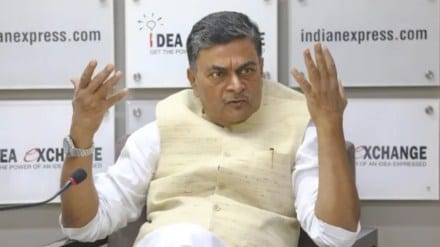As COP28 meet being held at Dubai, Union Minister for Power and New & Renewable Energy R K Singh asserted that India is leading the world in renewable energy transition. “Now, the need is for developed countries, who are the highest carbon emitters, to reduce their emissions”, he said.
Stating that India is the only country to achieve Nationally Determined Contributions (NDCs) nine years in advance, the minister said the country has been able to deliver our emission intensity targets 11 years ahead of the proposed time period.
In the NDCs, India pledged to bring down the emission intensity by 33% by the year 2030, but achieved this in 2019 itself. India also pledged to have 40% of the non-fossil based energy by 2030. And currently, India has total non-fossil based capacity at 1,86,000 MW (Including 1,79,000 MW of renewable energy capacity and 7,000 MW of nuclear energy) which is 43% of our total capacity.
The minister said that the climate change has become a serious threat for the planet in view of which the developed countries with more than triple capita emission than the global average need to reduce their per capita and total emission. “If we look at the emission that has led to 1.1 degree celsius rise in temperature compared to the pre-industrialization era, we will see that 80% of the emission responsible for the rise in temperature came from the developed countries. India is one of the largest contributors but our per capita emission (2.9 tonne per annum) is just around one third of global average per capita emission (6.8 tonne per annum) while the developed countries have a per capita emission of around 14 – 15 tonne per annum”, said Singh.
Speaking at the inauguration of a two-day conference on energy transition in India in Gandhinagar, he appreciated Gujarat’s leadership in renewable energy capacity development. Singh said, “Gujarat has the capacity to lead the country in renewable energy and the state’s target to achieve net zero emissions by 2047 is admirable.”
Commenting on the challenges in the Renewable Energy sector, the Power Minister said, “Availability of equipment or the supply chain challenges, and the storage infrastructure for renewable energy and the development of nuclear energy ecosystem are the major challenges for India in achieving the 2070 net zero target.”
“India is working hard to increase the renewable energy manufacturing capacity to 48,000 MW by the year 2030 from the current capacity of 20,000 MW. The storage manufacturing capacity for renewable energy is a major challenge. It currently costs around Rs 10 to store 1 KW of renewable energy for one hour. Given the cost of production at Rs 2.40 per unit, makes the energy price at atleast Rs 14 per unit which is not practical for the consumers”, added Singh.
